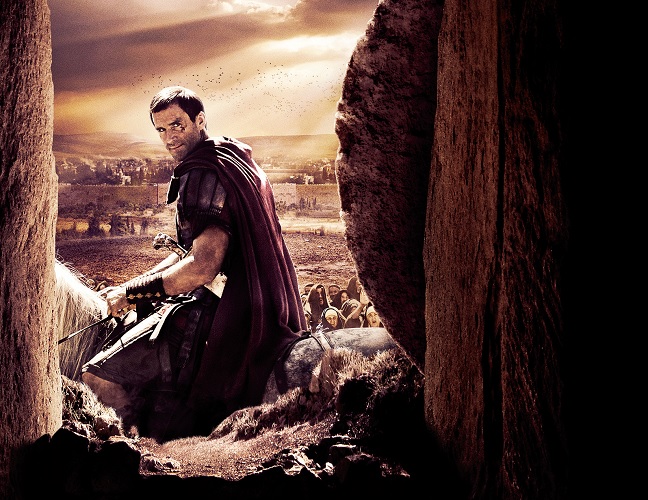For the Romans, another rabble rouser is no more.
Or is He?
Jesus had promised He would rise from the dead after three days. The powers-that-be were determined to prevent His followers from stealing the body to prove the claim had come to pass.
“If his body vanishes, we have a potential Messiah,” Caiaphas, the leader of the Sanhedrin (the Jewish “supreme court”), warns the Roman governor, Pontius Pilate. For the rulers of the occupied territory, that would mean the spectre of armed rebellion.
Pilate tasks a Roman centurion named Clavius (Joseph Fiennes, Shakespeare in Love, Enemy at the Gates) to make sure that the dead stays dead. It seems like a routine matter. What could go wrong?
“The tomb is sealed,” Clavius orders the soldiers under his command. “Guard it with your life.”
But the unbelievable occurs. When Clavius reaches the scene on the third day, he finds the soldiers scattered, the tomb opened—and Jesus' body has vanished.
Clavius' superior is not amused.
“You will track down the corpse, take control out there and finish this,” Pilate tells his centurion. Clavius and his aide, Lucius (Tom Felton, Draco Malfoy in the Harry Potter series), need “to find the body, dispel rumours of a risen Messiah and prevent an uprising in Jerusalem.”
How hard can it be to track down a corpse?
Intriguing Tale
This is the premise of Risen, a new movie out in theatres this month. But why another Jesus story?
Risen is a Jesus story with a twist.
Whereas New Testament-inspired movies usually follow Jesus' storyline from His perspective or that of His followers—think Ben-Hur, The Passion of the Christ and the Jesus of Nazareth TV miniseries—Risen seeks to tell a different side of the story.
“No one ever tackles what happened between the Crucifixion and the Resurrection,” said Risen's producer, Rich Pelusi, in a recent interview with CBN. “The second thing that's completely fresh about this movie is that most stories of Christ are told through either an omniscient point of view or through a disciple's point of view. This story is told through the eyes of a non-believer, Clavius. Because of this perspective, what we're seeing from non-Christians and those who do not regularly attend church is that they do not feel preached to when they are watching the movie. They don't feel hit over the head with Jesus or the Bible. But they are intrigued by this man and His followers, and it's exactly that intrigue that could lead them to explore the Bible and the teachings of Jesus Christ.”
Eliminating the Impossible
For Fiennes, this intrigue is central to the movie.
“Risen is an incredible film noir detective tale,” he states. “That's the angle that appealed to me.”
 Clavius (Joseph Fiennes) clashes with his aide, Lucius (Tom Felton, right), over whether Jesus has risen
Clavius (Joseph Fiennes) clashes with his aide, Lucius (Tom Felton, right), over whether Jesus has risen
Like a modern-day gumshoe, Clavius tackles his assignment with ruthless efficiency. His troops conduct house-to-house searches, question “the usual suspects” such as Mary Magdalene, comb the ossuaries and even dig up the graves of those who had been buried in Jerusalem that week.
But the more he investigates the dis¬appearance of Jesus, hoping to root out answers and satisfy his political mas-ters, the more he uncovers questions, such as:
Could Jesus have survived the Crucifixion and escaped by Himself, the ultimate inside job? As a seasoned veteran, Clavius had no doubt seen crucifixions. After a whipping and a scourging that would have killed most men outright, after six hours on the cross, after a spear to the side, could anyone have had the strength to roll back the massive rock that barred the tomb and escaped? Clavius doubts it.
Could Jesus' enemies have stolen the body? Unlikely. They could have every-thing to gain by showcasing the corpse: At one stroke, Christianity would have lost all credibility. But they did not.
Could Jesus' body have been liberated by His disciples? Possibly, but no one gives up their lives for a lie and the followers of Jesus spent the rest of their lives proclaiming the truth of the Resurrection, some even becoming martyrs for that truth. Clavius is wise enough to know that people never die for a lie.
As another great detective, Sherlock Holmes, famously said, “When you have eliminated the impossible, whatever remains, however improbable, must be the truth.”
The Risen Truth
Clavius started his investigation thinking he would easily debunk the claim that Jesus is the Son of God. But the further he probes the mystery, the more he realizes that he is a pawn in a much larger game, and the assumptions he had taken for granted are false.
“You're looking for something you will never find,” cautions Mary Magdelene. “Open your heart and see.”
To discover the truth, this Roman unbeliever has to look inside himself and find faith, the faith that all those who believe in God possess.
“I serve the Roman Empire,” says Clavius. “I fought wars against those who did not believe in our gods. But nothing could prepare me for the truth that is now risen.”
(Photos: Courtesy of Sony Pictures)










Now I want to view this movie! On my way to buy it...